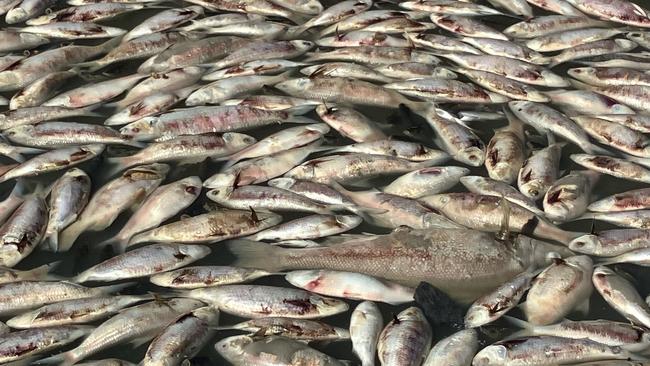Menindee takes centre stage in water policy tussle
A change of government in NSW would bring a major shake-up to the state’s water policy. Here’s what you need to know ahead of the election.

One week out from the NSW state election, a putrid smell hangs over kilometres of dead fish and thick, fluorescent algae in far west NSW.
National news programs and social media feeds have filled with videos of a river turned white from the upturned carcasses of bony bream, Murray cod, golden perch, silver perch, and carp.
The fish kill is bad timing for the NSW Coalition, which is fighting to hold onto government in the face of strong campaigns by Labor and the Greens.
Water Minister Kevin Anderson, busy campaigning in his electorate of Tamworth in the state’s north, has said little about the disaster.
“Events like these are not uncommon after large-scale floods and are often unavoidable,” he said through a spokesperson on Monday.
Labor and the Greens, as well as locals in Menindee, disagree. Resident and water activist Graeme McCrabb said the scale of the event was unlike anything he had seen, outstripping even the record 2019 fish kills while Menindee was in drought, and there was more that could have been done to prevent it.
“It’s just carnage. There are so many dead fish, you just can’t fathom it,” he said.
“We knew we had a blackwater event coming down the river. We haven’t improved our data collection (since 2019) and no one can make real informed decisions on planning or operations if you don’t have the data.”

Labor and the Greens say problems in the management of the Darling-Baaka run deep.
Both parties are offering water policies that would represent a big shift in direction by the state if elected, and are using the fish kill to amplify their messages.
“The reality is the Darling River is very sick. Years of mismanagement by the NSW government has exacerbated the impact of our changing climate – this local ecosystem has been pushed to breaking point,” Labor’s water spokeswoman Rose Jackson tweeted on Friday, along with a video of dead fish in the Lower Darling that has been viewed 11,000 times.
Labor’s stated water policy is sparse, but it differentiates itself from the Coalition in two key areas.
Speaking at a forum organised by the Nature Conservation Council last week, Ms Jackson backed the direction federal Labor has taken on water under Minister Tanya Plibersek — a direction that has included 49GL of water buybacks from irrigators and an openness to further buybacks if required.
“Labor supports the Murray Darling Basin Plan. We support its implementation in full,” Ms Jackson said.
“The role that (Ms) Plibersek, has played since she has been elected is indicative of the approach that a (NSW) Labor government would take.”
A NSW government backing buybacks would leave just Victoria in opposition to the water recovery method.
NSW Labor has also opposed flood plain harvesting regulations for the northern valleys of the Murray Darling Basin without significant downstream flow targets.

Meanwhile, the NSW Greens are putting a laser focus on Menindee in the final week of the state election campaign, with MP Cate Faehrmann due to fly in to the regional town on Tuesday.
The party, which is aiming to take the balance of power by electing seven MPs in both houses of parliament, announced its “plan to save the Darling-Baaka” last week.
The plan involved the creation of a new Department of Climate, Water, and Environment, setting strict downstream flow targets, and factoring climate projections into water allocations.
For Mr McCrabb, the political tussle over his home was difficult to watch.
“I just want to rip my ballot paper up and put it in the bin,” he said.

The official cause of the fish kill, according to the NSW Department of Planning and Environment, was last week’s heatwave. When combined with the mass of biomass in the river and the fish breeding boom that followed the NSW floods, the high temperatures led to dissolved oxygen in the water dropping to zero on Sunday. (Fish start to die at oxygen levels below 2 mg/L).
But experts such as University of Sydney school of life and environmental sciences associate professor Joy Becker have cautioned it is too soon to know exactly what has caused the fish kill, and say a full investigation must be carried out.
UNSW professor Richard Kingsford wrote this week the fish kill was exacerbated by a lack of flow in the Darling-Baaka, which meant fish were unable to escape as de-oxygenated water arrived from upstream.
The NSW Environment Protection Authority was still carrying out toxicology and pesticide test results this week.





